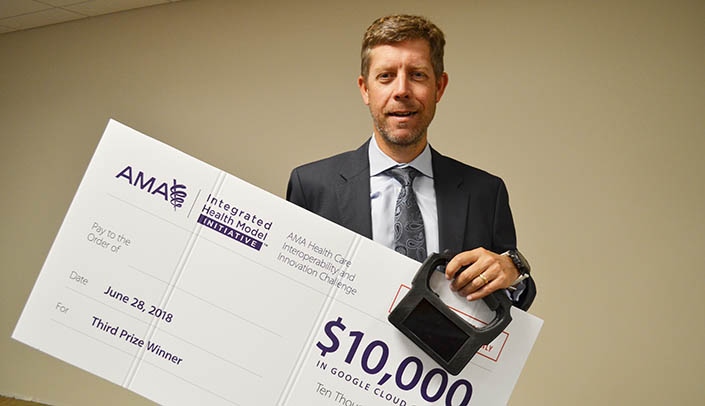How do you know if someone who is about to undergo a major surgical procedure is frail?
About frailty and FutureAssure
- More than half of all U.S. surgeries are performed on patients age 65 or older, and one-third of patients aged 65-85 will undergo a major surgical procedure within the last year of life.
- For many patients, surgery will confer substantial benefits, while others will experience significant harm. To obtain optimal surgical outcomes in this population, patient selection for surgical procedures is of utmost importance.
- Frailty is defined by a complex phenotype of functional decline typical of patients near the end of life.
- Frailty is a more powerful predictor of surgical outcomes than classic risk factors including age and comorbidities.
- People who are frail have an increased risk of death, disability and institutionalization.
- Widespread adoption of frailty screening has not occurred due to the inability to screen large patient populations in clinical settings.
- Subjective assessment – by the physician’s eyeballs – remains the predominant method of determining surgical risk.
- FutureAssure’s risk assessment system is more rapid, reliable and robust than current methods of collection and can be obtained during any surgeon office visit.
- The device used to measure frailty is mobile. It can be sent home with patients after surgery, so that there is a constant connection between the patient and the doctor’s office.
- Development of the FutureAssure device was a team effort with Dr. Johanning working with: UNeTech, an institute to help promising start-up companies at UNMC and UNO become successful; the Biomechanics Laboratory at UNO; and a team of academic physicians from the University of Pittsburgh, Stanford University and Baylor University.
- The FutureAssure system can collect both clinical and research data that is usable across multiple platforms and is compatible with electronic medical records.
That’s a question that Jason Johanning, M.D., and his startup company, FutureAssure, is trying to answer.
A vascular surgeon at UNMC/Nebraska Medicine and the VA Medical Center, Dr. Johanning’s concept for measuring frailty received a huge vote of confidence last month when he was awarded third place honors in the AMA Health Care Interoperability and Innovation Challenge held on the Google campus outside Boston.
With 36 developers participating, competition was fierce. Dr. Johanning had five minutes to convince the judges of the value of his product — a novel device that can collect frailty metrics in preoperative surgical patients in the standard clinical setting.
He pulled out all the stops. Wearing sunglasses during his opening, Dr. Johanning’s first two slides featured Tom Cruise and tied the operating room and frailty to the “Danger Zone” and “Risky Business.” He even used a couple slides featuring Warren Buffett, who will turn 88 on Aug. 30 and epitomizes someone who would be evaluated for frailty using the device.
In finishing third, Dr. Johanning was awarded $10,000 in Google Cloud credits — enough to get FutureAssure up and running on Google Cloud.
With health care dollars being pinched, it has never been more important for physicians to make good decisions when determining which patients are frail for surgery to optimize outcomes for patients and providers alike.
The data shows that frail patients will have much longer hospital stays and more difficult recoveries. They will rack up three times the costs of the average patient and many will be discharged to nursing homes and skilled nursing with high readmission rates.
The device Dr. Johanning uses to determine frailty is compact and simple. It is given to patients when they enter the surgery clinic.
The patients answer prognostic health questions that appear on the device’s screen and provide an assessment of their basic daily living skills. It takes about two minutes. Then by walking with the device and squeezing the handle, a computer assesses the patient’s walking speed and handgrip strength, indicators — if low — that signal the physician of the potential for increased postoperative complication rates.
“Ninety percent will be normal,” Dr. Johanning said. “It lets you identify the 10 percent who need to take a surgical pause.”
Having developed prototypes, FutureAssure is in the process of manufacturing the devices and anticipates deploying them in several Omaha clinics and select national sites.
But, to get to the next level, Dr. Johanning said the company will seek funding from investors.

Way to go!
Congratulations to Dr. Johanning, a well-deserved honor. This is such a great project, so very important in making the best decisions for treating our patients. Great work!
Congratulations Dr. Johanning!
This is wonderful Dr. Johanning!